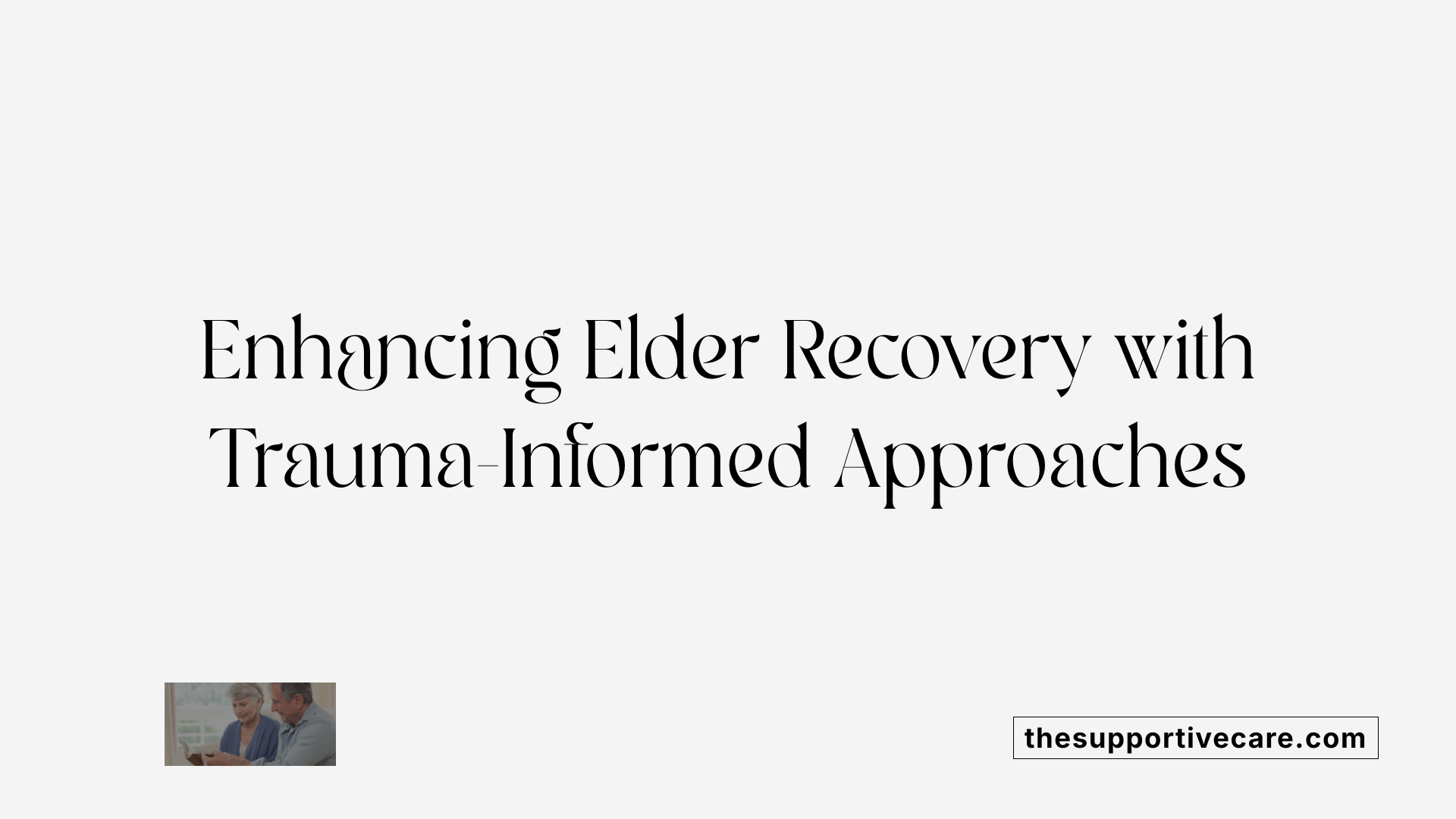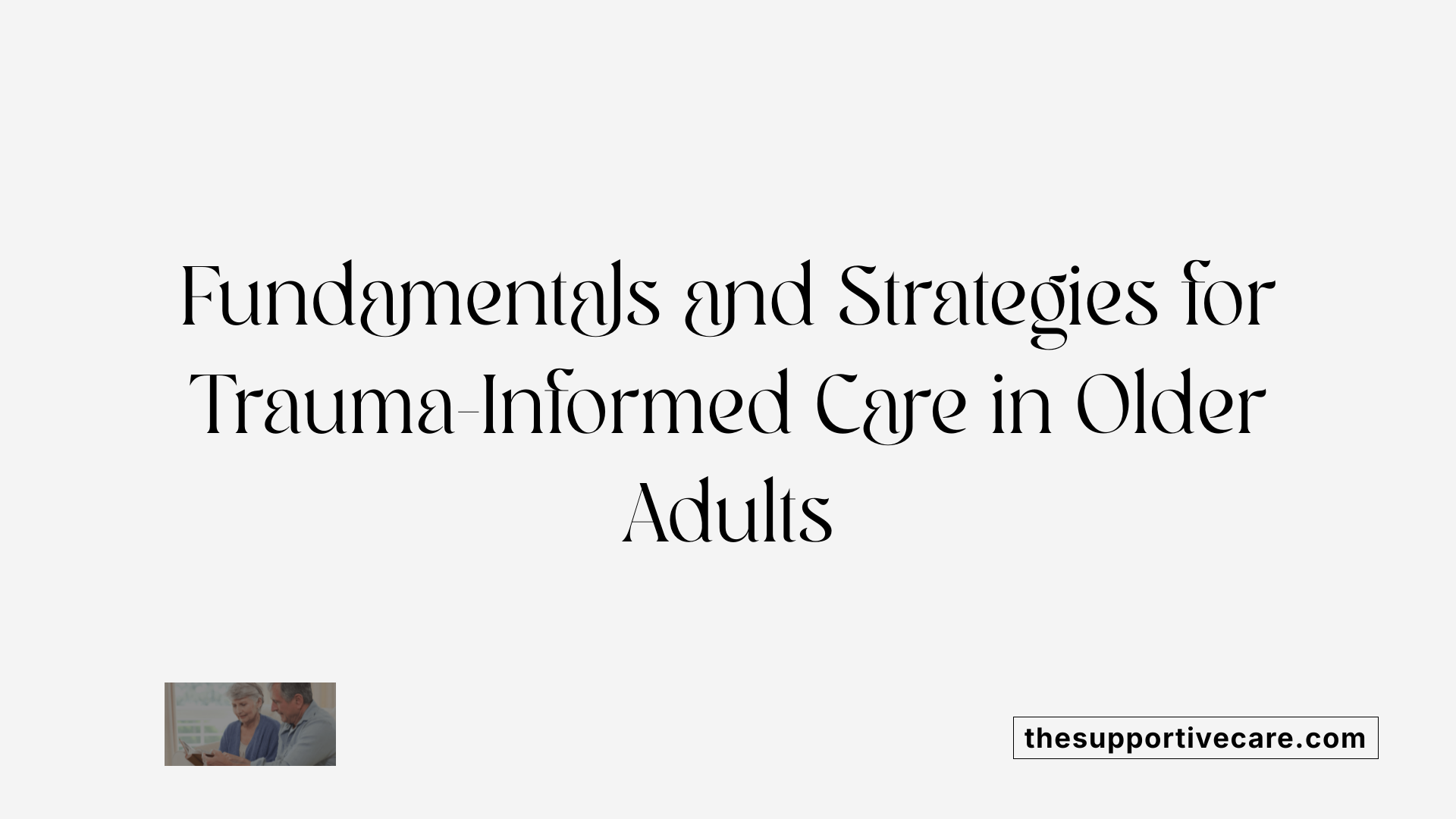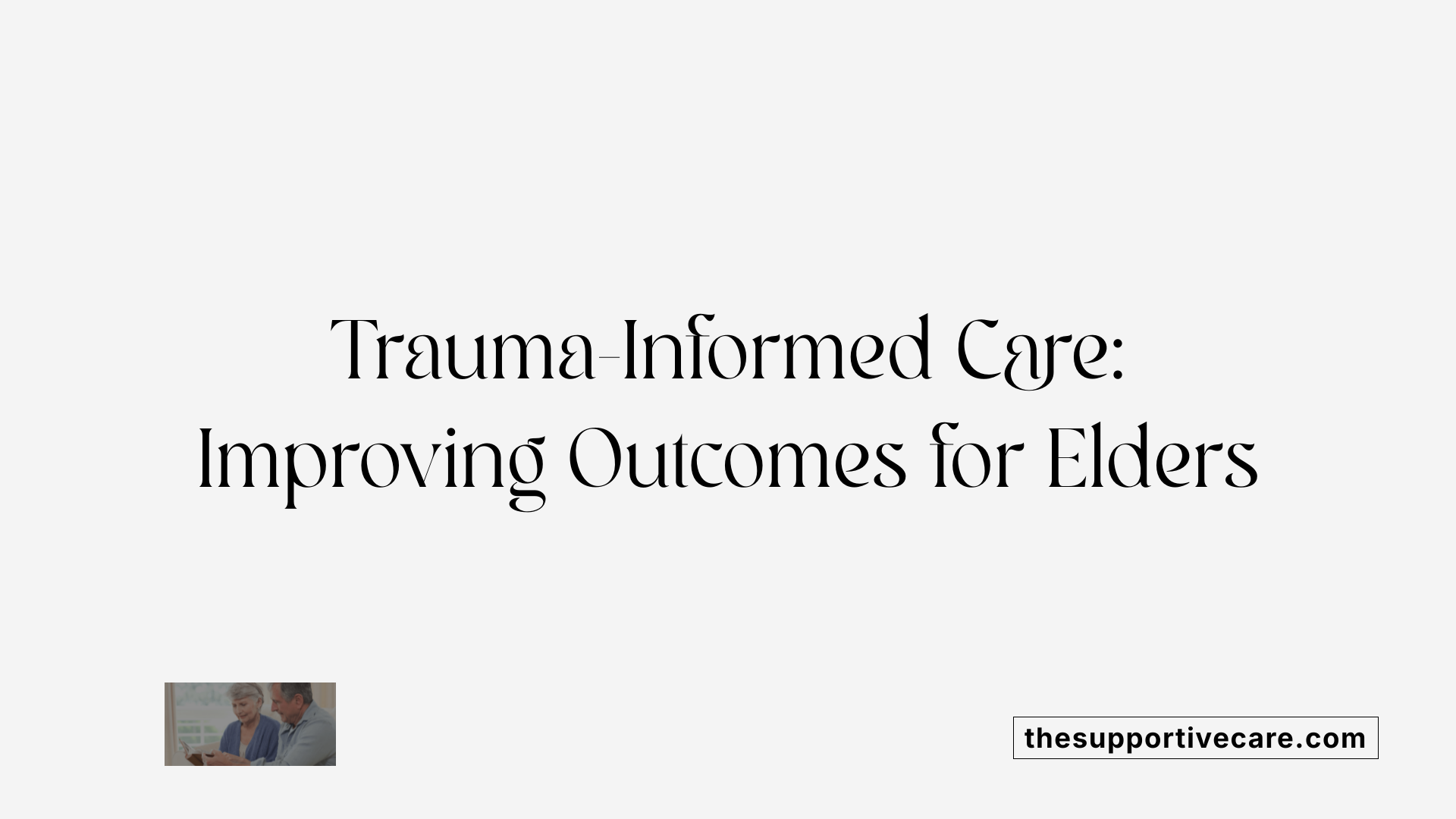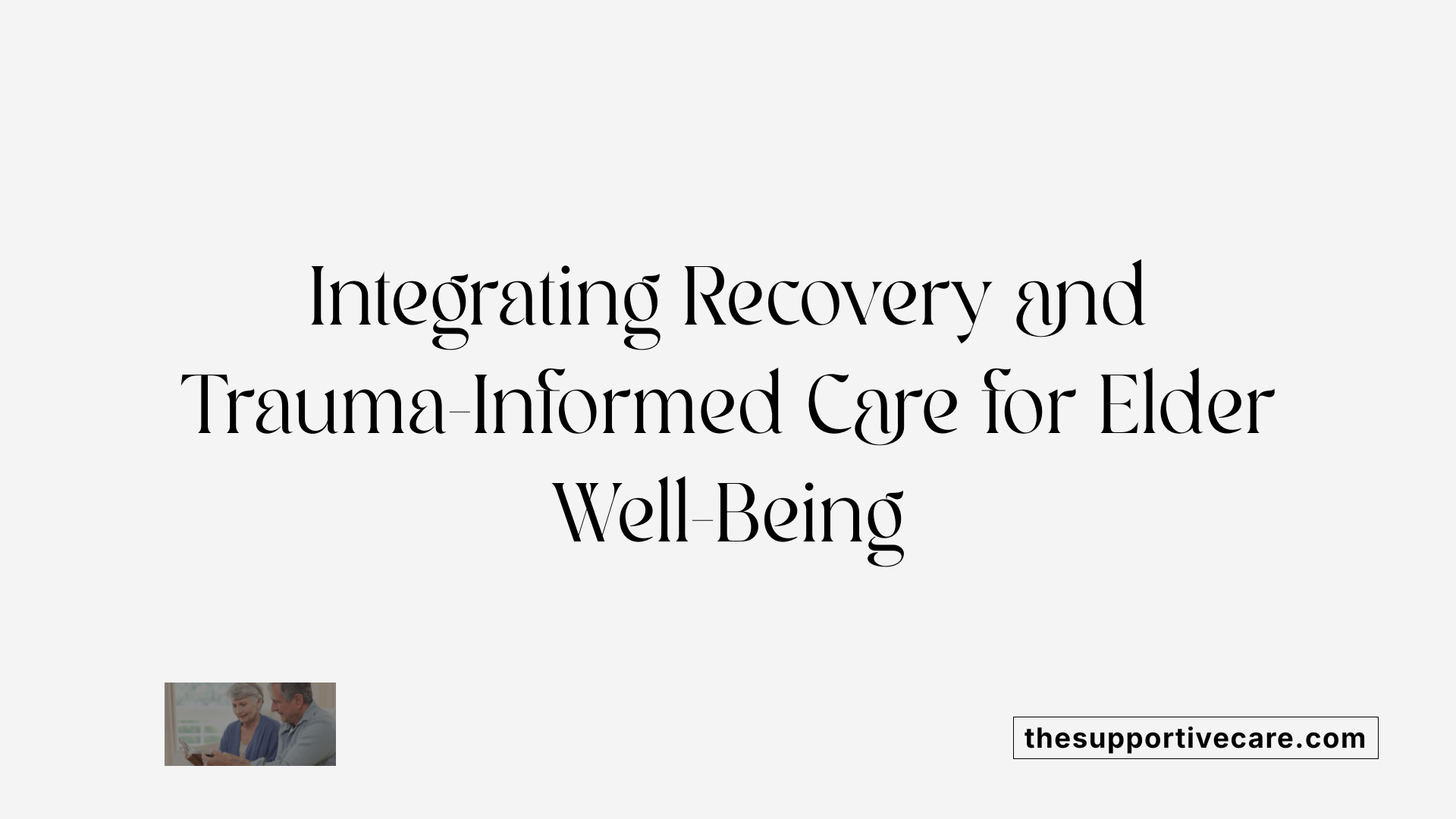Understanding Trauma in Elder Mental Health
Trauma-informed care (TIC) has emerged as a crucial model in behavioral health services, emphasizing the significance of understanding trauma's pervasive impact on individuals, particularly elders. With a significant portion of older adults experiencing past trauma, including childhood adversity and complex trauma, implementing TIC approaches offers an opportunity to improve treatment outcomes in mental health and substance use disorders within this vulnerable population.
Integrating Trauma-Informed Care in Comprehensive Addiction Treatment for Elders

What comprehensive treatment services are available for substance abuse?
Comprehensive treatment for substance abuse combines multiple approaches to meet individual needs effectively. These services generally include medical detoxification, which helps safely manage withdrawal symptoms. Behavioral therapies such as cognitive behavioral therapy (CBT) and contingency management are used to modify harmful thought patterns and behaviors linked to substance use.
Medication-assisted treatment (MAT) employs medications like methadone, buprenorphine, or naltrexone to curb cravings and prevent relapse. Alongside these interventions, individual and group counseling support emotional healing and offer peer support. Support groups and structured outpatient or inpatient programs ensure ongoing care and relapse prevention, creating a holistic framework for recovery.
How are mental health issues addressed in addiction treatment programs?
Mental health conditions commonly co-occur with substance use disorders, and effective treatment programs incorporate integrated care for both. Through comprehensive assessments, clinicians diagnose co-occurring disorders and develop personalized plans that blend mental health counseling, behavioral therapies, and psychiatric support.
Evidence-based methods like motivational interviewing and family-based interventions address both substance use and mental health symptoms simultaneously. Medications may be prescribed to alleviate psychiatric symptoms while supporting addiction recovery. Programs including those found in specialized health systems prioritize treating mental health challenges alongside substance use to improve overall patient outcomes.
What is the role of trauma-informed care in enhancing treatment outcomes for elders?
Trauma-informed care (TIC) focuses on understanding how past traumatic experiences impact individuals’ mental health and substance use, emphasizing safety, empowerment, and cultural sensitivity. Since many elders have complex trauma histories, TIC creates a treatment environment that fosters trust and prevents re-traumatization.
By integrating TIC principles, addiction and mental health services for older adults become more responsive to their specific needs. TIC promotes openness, self-determination, and collaboration, which can improve engagement and retention in treatment. This approach also supports long-term recovery by equipping elders with coping skills and creating compassionate settings where trauma's effects are acknowledged and addressed.
Overall, coupling trauma-informed care with comprehensive addiction and mental health treatment ensures a person-centered approach that recognizes the unique challenges faced by elders. This integration not only addresses substance use and psychiatric symptoms but also facilitates healing from underlying trauma, ultimately enhancing treatment effectiveness and recovery quality.
Common Addictions in Elder Populations and Trauma's Role

What types of addictions are commonly treated in comprehensive addiction programs?
Comprehensive addiction programs address a wide spectrum of addictions to provide holistic support. Among older adults, these programs commonly treat substance-related addictions such as alcohol, opioids, stimulants, and sedatives. Alongside these, behavioral addictions including gambling, internet gaming, excessive shopping, and food addiction are also important targets of treatment. Given the unique challenges in the elder population, treatment approaches are carefully tailored, integrating medical care, counseling, behavioral therapies, and peer support.
How does trauma contribute to the development of addictions in older adults?
Trauma plays a significant role in the development and persistence of addictions in elder populations. Many individuals report experiences of trauma such as childhood abuse, neglect, or loss, which lay foundations for health-risk behaviors including substance use later in life. Trauma causes long-lasting changes in brain function, heightening sensitivity to stress and increasing vulnerability to using substances as coping mechanisms. Complex trauma or repeated adverse events often compound emotional dysregulation, leading to addictive behaviors as attempts to manage overwhelming feelings.
How can trauma-informed approaches aid recovery in elders?
Trauma-informed care (TIC) is pivotal in addressing the unique needs of elder individuals in addiction treatment. TIC prioritizes creating a safe and empowering environment, recognizing the widespread impact of trauma. By fostering trust, choice, and collaboration, TIC promotes recovery that honors the lived experiences of older adults. Importantly, trauma-informed approaches reduce the risk of retraumatization during treatment and support integrated care, addressing both addiction and trauma-related mental health concerns. This creates a foundation for improved psychological well-being, sustained sobriety, and enhanced quality of life in elder patients.
Core Principles and Implementation of Trauma-Informed Care for Elders

What Are the Fundamental Elements of Trauma-Informed Care?
Trauma-informed care (TIC) centers around understanding the deep impact that trauma can have on a person's mental and physical health. It prioritizes creating environments that promote safety, fostering empowerment, and respecting cultural sensitivity. This means clinicians aim to establish trust, involve clients in their own care decisions, and tailor approaches considering each individual's unique background and experiences.
How Does TIC Address the Needs of Older Adults?
Applying trauma-informed care to elder populations involves recognizing that many older adults carry diverse trauma histories that may affect their wellbeing. These might include lifelong adversities like abuse or neglect, as well as trauma related to aging or loss. TIC approaches ensure that care providers validate these experiences, safeguard the elder's dignity, and provide support that respects their cultural identity and individuality.
What Are the Challenges and Opportunities in Applying TIC to Elder Mental Health?
Challenges include overcoming institutional barriers where older adults might not always be screened for trauma histories or where staff may have limited training in trauma-informed approaches. Additionally, elders may face stigma or isolation, complicating open discussions about trauma.
On the flip side, implementing TIC offers significant opportunities for improving elder mental health outcomes. Organizations that embrace TIC can foster environments that reduce re-traumatization and enable older adults to engage actively in their care, enhancing their sense of control and promoting recovery.
Why Are Systemic and Organizational Changes Crucial for TIC?
Effective trauma-informed care requires more than individual clinician effort — systemic adjustments are essential. This includes comprehensive staff training to increase trauma knowledge, policy reforms to prioritize trauma-sensitive practices, and organizational cultures that emphasize support and empowerment for both clients and employees.
Such changes enable consistent, compassionate care tailored to elders’ needs and help sustain TIC as a core service component rather than a one-time initiative. Through these efforts, organizations can better support older adults on their healing and recovery journeys, reflecting the dignity and resilience of this population.
Positive Outcomes of Trauma-Informed Care in Behavioral Health Services

How Does Trauma-Informed Care Improve Mental Health Symptoms?
Trauma-Informed Care (TIC) has demonstrated substantial benefits for mental health symptoms such as depression, anxiety, and PTSD. Clinical studies highlight significant reductions in these symptoms among clients after TIC interventions, particularly within residential treatment settings. For example, young adults in a residential substance use program showed marked improvements in depression, anxiety, and PTSD symptoms following a trauma-informed treatment model.
What Effects Does Trauma-Informed Care Have on Substance Use and Treatment Retention?
TIC approaches have been effective in reducing substance use involvement. Research shows clients experienced significant declines in substance use at three months after treatment, with a notable effect size indicating meaningful change. Additionally, TIC supports better retention in treatment programs; about 48% of clients successfully completed a full 6-week program under trauma-informed care. These results suggest that TIC not only supports behavioral change but also encourages sustained participation in recovery programs.
How Does Trauma-Informed Care Benefit Clients and Healthcare Staff?
Beyond client outcomes, TIC positively affects healthcare providers. Staff reported high levels of support and increased confidence in delivering trauma-informed services. Knowledge about trauma among staff improved over time, as did their professional quality of life. These factors contribute to a healthier work environment and better care delivery. The acceptability and feasibility of TIC in diverse settings strengthen the therapeutic alliance and encourage supportive practices that benefit both clients and care teams.
These findings demonstrate that trauma-informed care creates an environment fostering healing and empowerment. It effectively addresses the complex needs of individuals with histories of trauma while enhancing the wellbeing of healthcare professionals involved in treatment.
The Complementary Role of Recovery-Oriented and Trauma-Informed Care in Elder Treatment

What is Recovery-Oriented Care (ROC) and How Does It Align with Trauma-Informed Care (TIC)?
Recovery-oriented care (ROC) focuses on supporting individuals to lead meaningful lives despite ongoing symptoms, emphasizing self-determination and person-centered approaches. This aligns closely with trauma-informed care (TIC), which centers on understanding trauma’s impact and fostering safety and empowerment. Both approaches affirm service users as persons, promote autonomy, and encourage involvement in their own care planning.
How Do These Approaches Promote Autonomy, Empowerment, and Prevention of Re-Traumatization in Elders?
In elder mental health treatment, ROC and TIC complement each other by creating environments that prioritize safety and respect. TIC principles help prevent retraumatization by recognizing trauma's lasting effects, while ROC empowers elders through self-directed recovery pathways. Together, they enable elders to regain control, build resilience, and participate actively in their healing journeys.
What Role Does Peer Support Play in Enhancing Trauma-Informed Interventions?
Peer support, delivered by individuals with lived experience, is integral to both ROC and TIC. It enhances trauma-informed interventions by providing relatable guidance, reducing stigma, and fostering trust. For elders, peer support can boost self-efficacy and emotional well-being, enriching the recovery experience and encouraging sustained engagement.
Why Is There a Need for Research and Guidelines to Optimize TIC and ROC in Elder Settings?
Despite growing recognition of the benefits of ROC and TIC, there is a need for shared definitions, evidence-based methodologies, and practical guidelines tailored to elder populations. Research focused on elders can clarify best practices, address diverse cultural and trauma backgrounds, and support effective implementation of these complementary models in various care environments.
Moving Forward with Trauma-Informed Elder Care
Recognizing the profound impact of trauma on elder mental health and addiction recovery is imperative for advancing comprehensive treatment approaches. Trauma-informed care, paired with recovery-oriented principles, provides a compassionate, empowering framework that addresses the complex needs of older adults. By fostering safe environments, integrating evidence-based interventions, and supporting both clients and healthcare providers, the behavioral health field can improve outcomes and quality of life for elders. Ongoing research, systemic commitment to TIC and ROC, and culturally sensitive practices remain essential for realizing the full potential of trauma-informed elder mental health care.
References
- TIP 57: Trauma-Informed Care in Behavioral Health Services
- Feasibility and outcomes of a trauma-informed model ...
- Integrating a Trauma-Informed Approach into Substance ...
- A Review of the Literature - Trauma-Informed Care in ... - NCBI
- Recovery-oriented and trauma-informed care for people with ...
- Trauma Informed Care (TIC) Interventions for Populations ...
- How Trauma-Informed Care Is Transforming Addiction ...
- Finding Help for Co-Occurring Substance Use and Mental ...
- Substance Use Disorder (SUD): Symptoms & Treatment



































































































